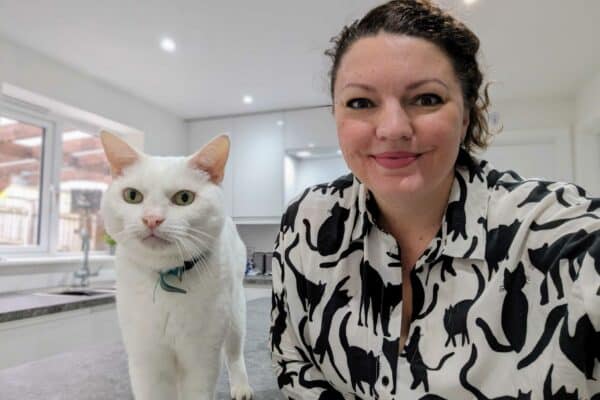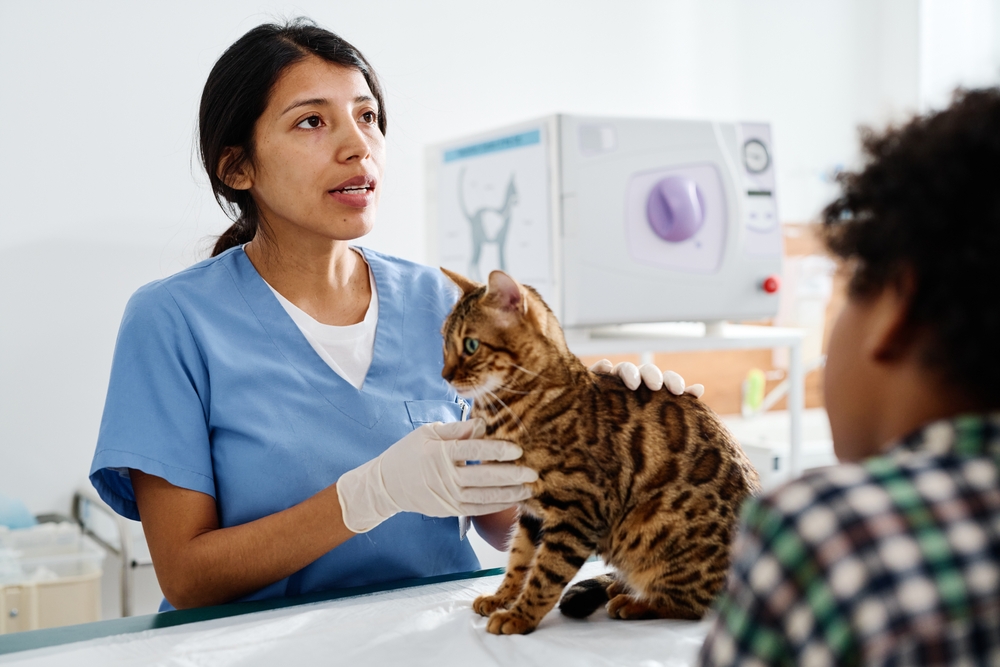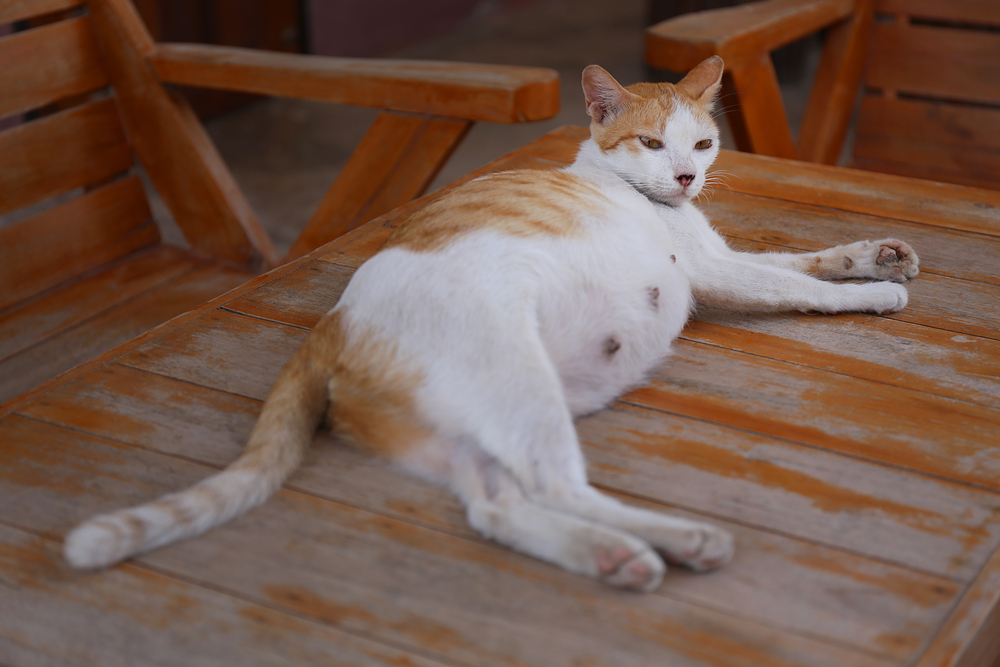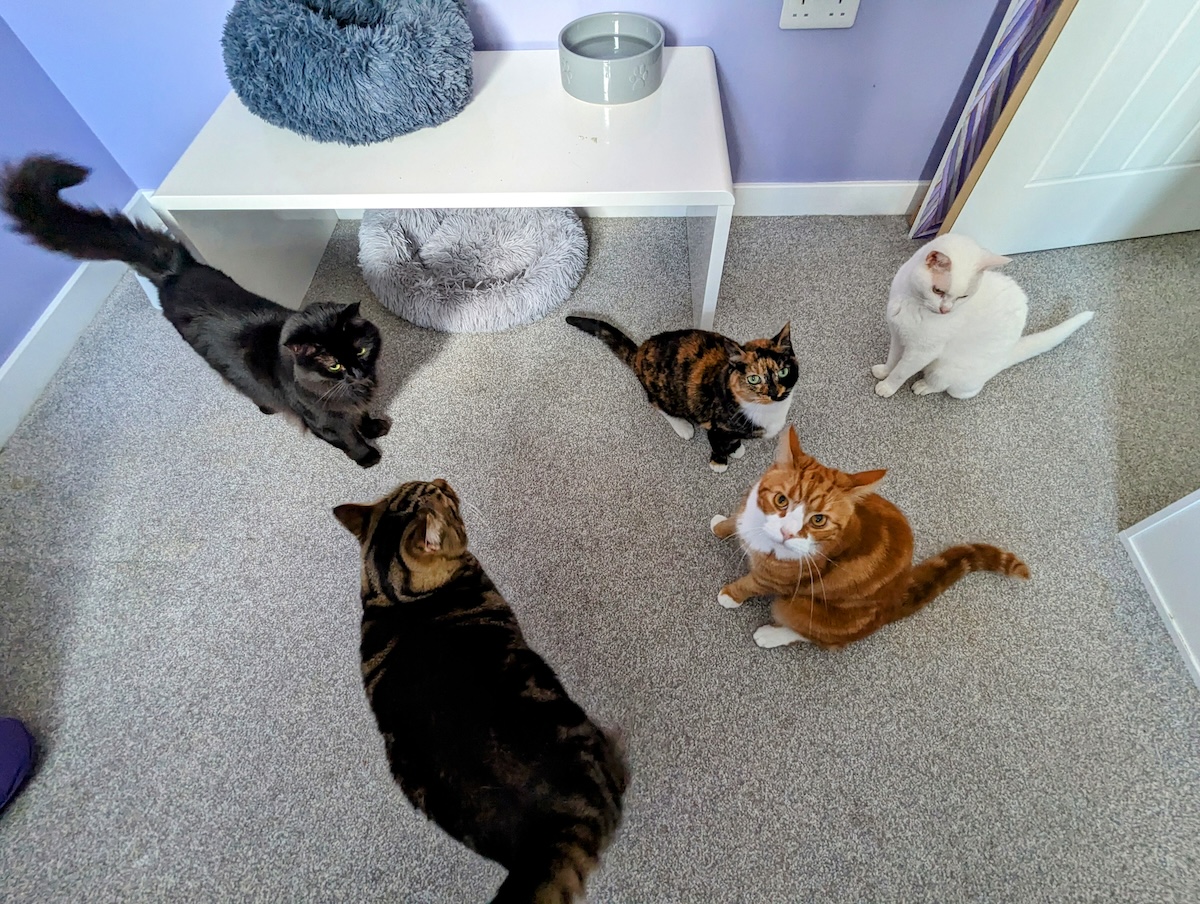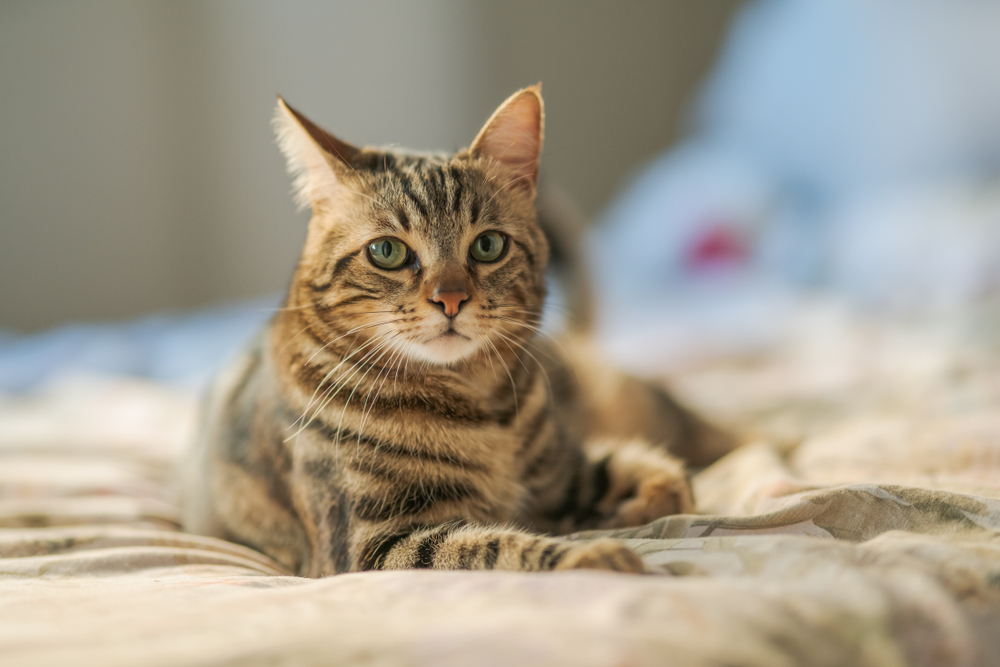Click to Skip Ahead
A vomiting cat isn’t exactly a rare phenomenon. Sometimes cats will vomit due to illness, an obstruction, or even just from eating too quickly, and some cats seem to vomit more often than others. If your cat seems to be emptying their stomach on a regular basis, you might start to wonder if cats can suffer from bulimia.
There are lots of different reasons why cats vomit, retch, or regurgitate, but bulimia is not one of them. Bulimia nervosa is an eating disorder, a serious and sometimes fatal illness that is associated with severe disturbances in behaviors, thoughts, and emotions about food. People suffering from bulimia will eat excessively, also known as binge-eating, then force themselves to vomit, or use diuretics and laxatives to purge themselves of the excess calories. Bulimia is not known to affect species other than humans.
But, if you are wondering if your cat could be suffering from this illness, then it’s likely that they are vomiting frequently enough to be causing you concern. Let’s take a look at the most common reasons why your cat might be losing their lunch and what you should do about it.

Vomiting, Regurgitation, and Coughing Up Hairballs
If we’re going to address what is triggering this behavior in your cat, it’s important to distinguish between vomiting, regurgitation, and bringing up hairballs, as this will go a long way to tell what is causing the problem.
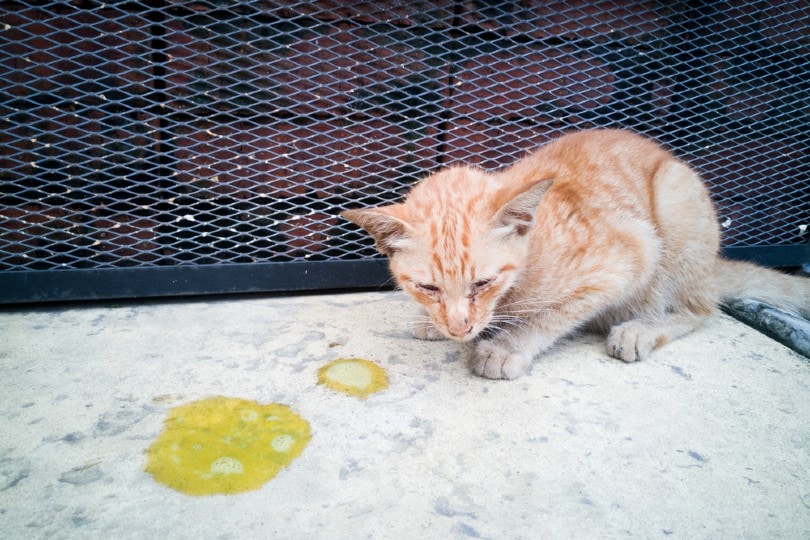
Regurgitation
- This is a more passive reflex where food (or other material) is ejected from the esophagus before it reaches the stomach.
- Does not involve abdominal effort.
- Occurs shortly after eating.
- Food usually comes out looking undigested and/or in a tube formation.
- Not usually associated with signs of nausea (drooling, licking lips, inappetence).
- Commonly occurs when food is eaten too quickly, if there is inflammation of the esophagus (esophagitis), or if there is a stricture or blockage preventing the food from entering the stomach
Vomiting
- Active ejection (emesis) of food/digesta/fluid from the stomach.
- Abdominal effort is usually observed.
- Normally happens at least 2–3 hours after eating.
- Can contain partially digested food, bile, and fluid.
- Usually associated with signs of nausea and abdominal discomfort/pain.
- May also see other signs of gastrointestinal upset (e.g., diarrhea).
- Can be caused by systemic disease (e.g., pancreatitis, kidney disease, diabetes), inflammatory disease(e.g., IBD, gastritis), or a physical obstruction in the stomach or intestines (e.g. foreign body, hairball).
Coughing Up a Hairball
- Not actually coughing.
- Hair accumulation in the esophagus causes irritation, triggering a retching action that sounds like coughing.
- May be non-productive, produce gastric fluid, or result in bringing up hair/hairballs.
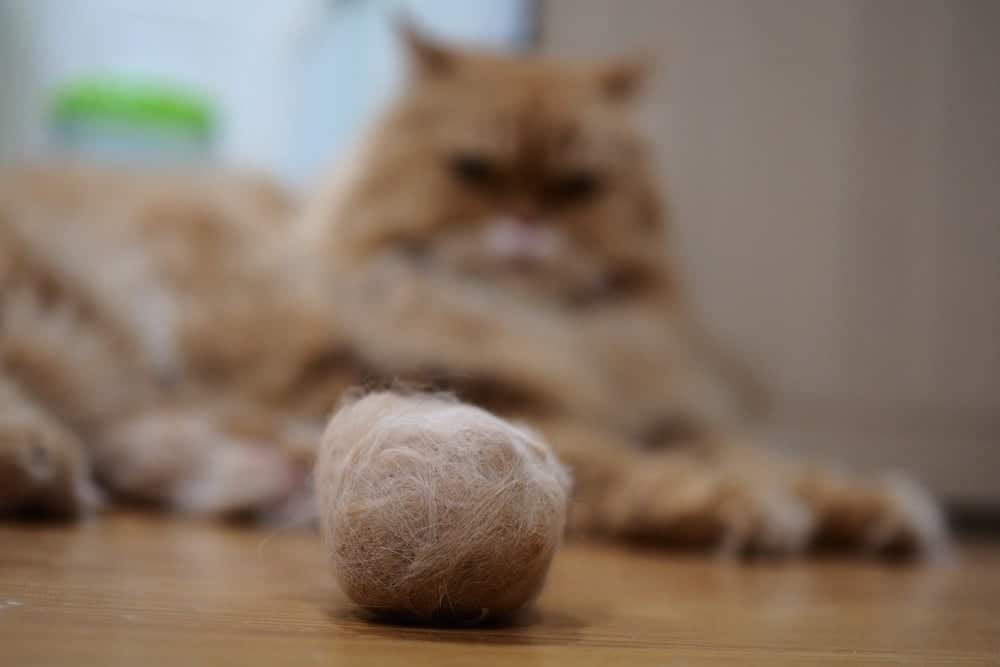
What Should I Do if My Cat Vomits or Regurgitates?
It is perfectly normal for cats to vomit or regurgitate from time to time, and if it is an isolated event and your cat is otherwise eating, drinking, and behaving normally and they aren’t losing weight, there is likely no need to be concerned.
When Should I Take Them to See the Vet?
If your cat has brought up fluid or food and you are worried about them, contact your vet to make an appointment for a checkup, as it’s always better to be safe than sorry.
- Inappetence: If they haven’t eaten anything for more than 24 hours
- Can’t stop vomiting
- Prolonged nausea: Drooling, licking lips, appearing depressed for more than 3–4 hours
- Abdominal pain/discomfort/swelling
- Dehydration
- Blood in the vomit
- If they have licked, eaten, or swallowed something that could be toxic or cause a blockage
- If it is happening regularly (more than once every couple of months)
If possible, try to take a video of what your cat is doing, or even a photo of what they bring up. All these things can help your vet diagnose the problem.
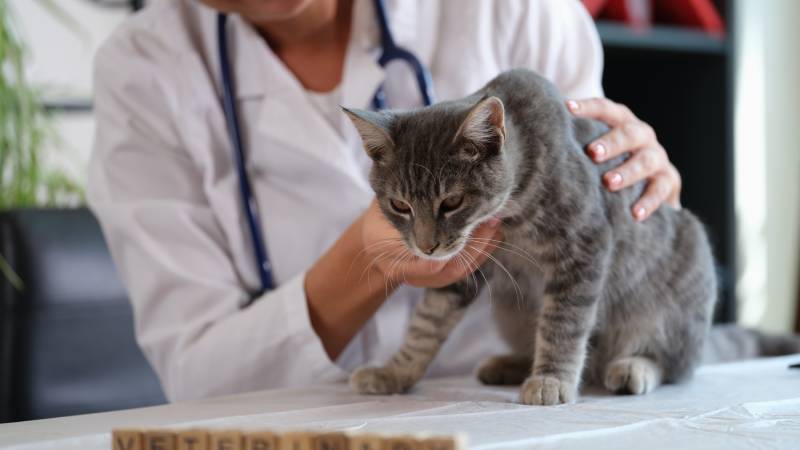
What Investigations Will My Vet Perform?
The specific tests and treatments will depend on whether your cat has been regurgitating, vomiting, or bringing up hairballs, and what other clinical signs they are showing, but they may include:
- A physical examination: Feeling the abdomen can be very informative, particularly in cats. Things like swelling, pain, organ enlargement, blockages, and fluid can usually be felt during an abdominal palpation.
- Blood tests: By running blood tests, your vet can check for a wide range of disease processes, including kidney and liver disease, diabetes, hyperthyroidism, and pancreatitis. Blood tests can also help with the diagnosis of infection or toxin ingestion.
- Imaging: Ultrasound and X-rays can help look for blockages in the digestive tract and abnormalities within specific organs, and look for signs of inflammatory bowel disease(IBD) or various cancers.

How Can I Help My Vomiting Cat?
If your cat is an occasional vomiter and your vet is happy that there are no significant problems, here are a few things that you can do to help your feline friend keep their food where it belongs—on the inside!
- Choose the right food: If your cat has IBD or a sensitive digestive system, feeding them a diet that contains good-quality, highly digestible ingredients is going to be the best thing you can do to help manage the condition.
- Slow things down: If your cat tends to eat too quickly, try scatter-feeding their kibble to slow them down. You can also buy or make slow-feeder bowls or spread their food in a large bowl so they cannot swallow big mouthfuls at once.
- Tackle hairballs: Regular grooming is the best way to help reduce the amount of fur that is in your house, on your clothes, and inside your cat. If your cat suffers from hairballs, sheds a lot, or is a long-haired breed, you might want to consider feeding them a diet, paste, or supplement specifically designed to help manage the problem.

Final Thoughts
Bulimia is a severe and complex eating disorder that can affect humans, but it does not affect cats. However, cats can experience a number of conditions that can make it seem like they are bulimic.
It is important to try to determine if your cat is vomiting, regurgitating, or trying to shift a hairball and to seek veterinary treatment if the problem is not just a one-off event.
It’s not unusual for cats to have the occasional upchuck, as any cat parent will surely attest to, and there are several ways that we can help our cats feel more comfortable, as well as reduce the amount of vomit stains on our carpets!
Be sure that your cat is eating the best food for them and that they aren’t eating it too quickly. Stay on top of hairballs with regular grooming, and always talk to your vet if things don’t seem right.
Featured Image Credit: Tom Wang, Shutterstock

